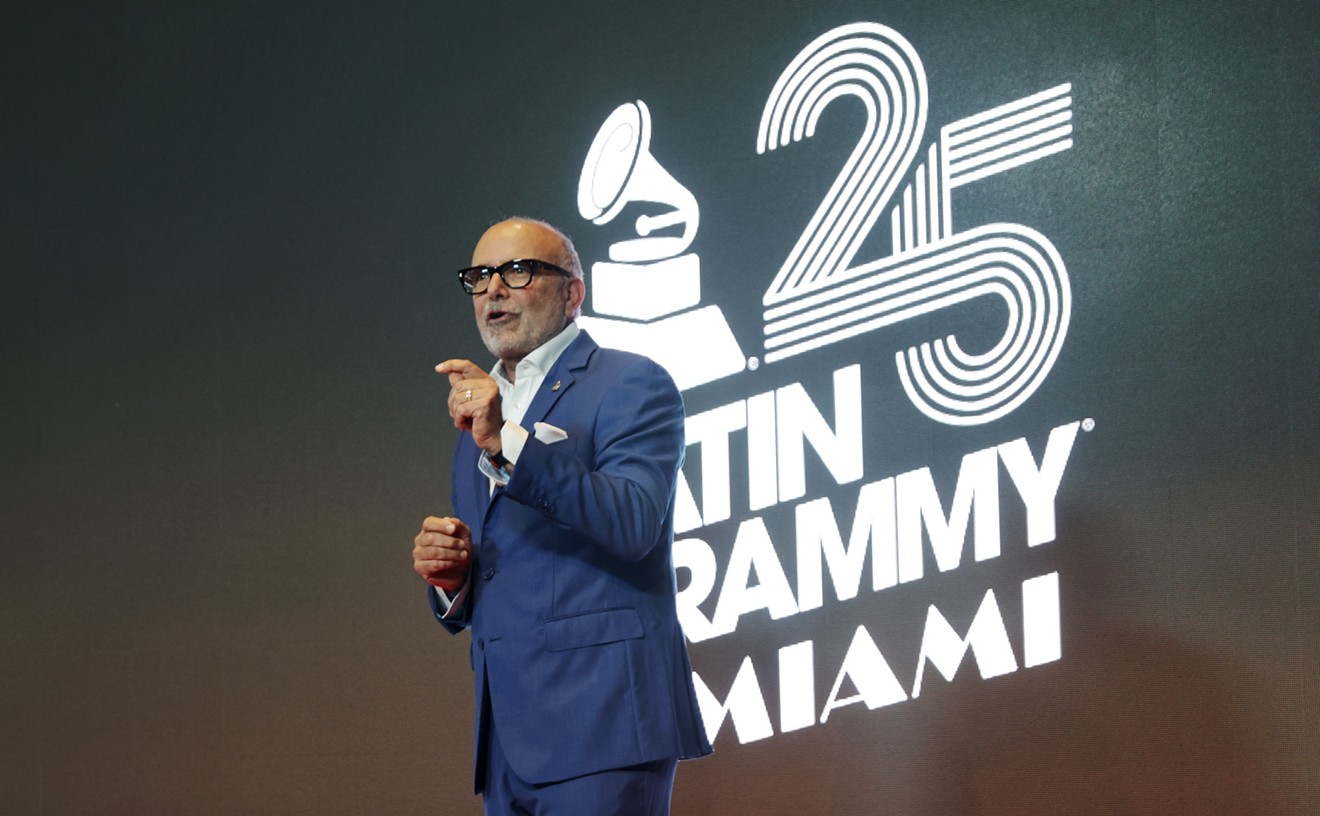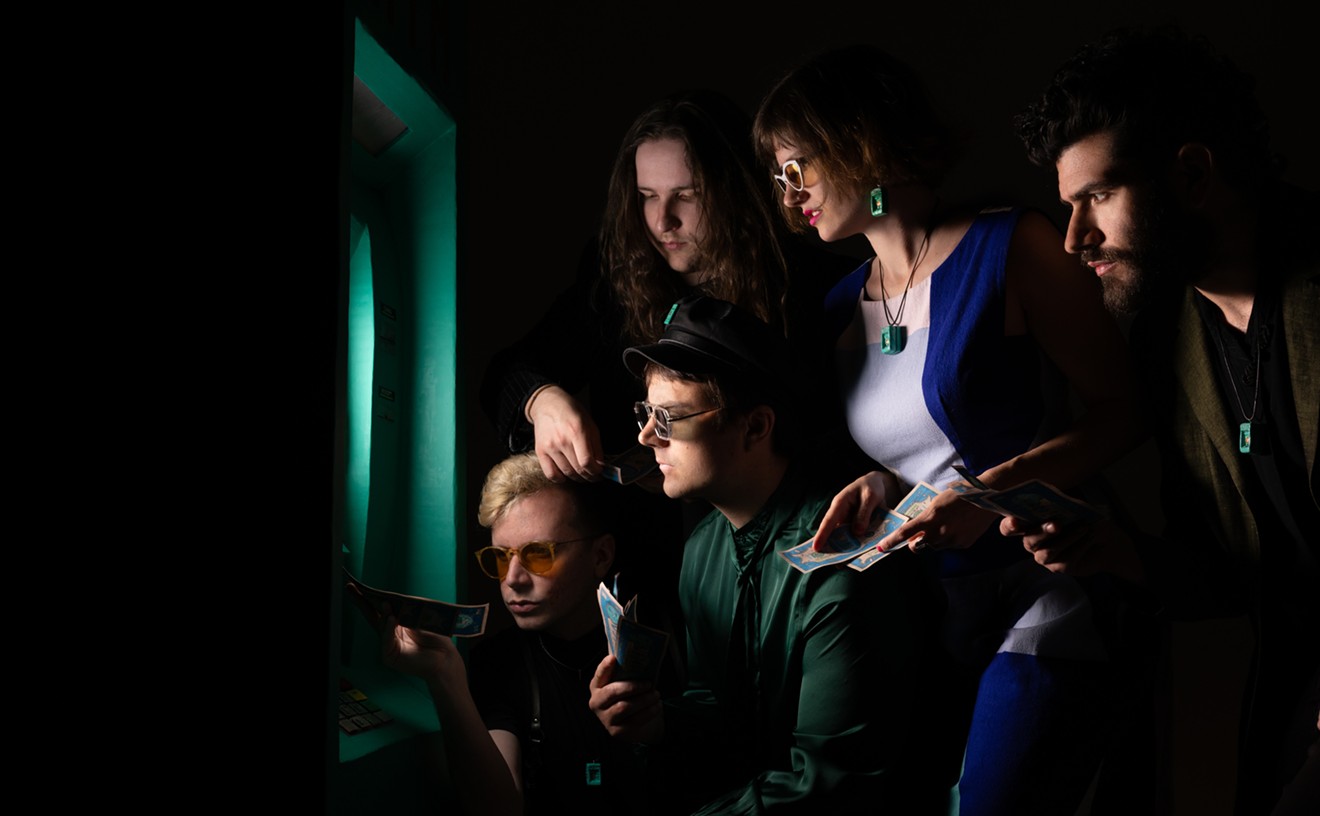The newest addition to the Chica family is a hairy little sweetheart named Gunner, a black Labrador retriever just shy of 2 years old — or around 17 in dog years. That makes him roughly the same age as his owner, Joseph Chica.
Though the pup, a guide dog in training, will one day help Joseph navigate
Born with Leber's congenital amaurosis, a progressive eye disorder that affects the retina, Joseph has been blind since birth, relying on a cane to get around since age 3.
"It wasn't like the piano was going to play for me."
tweet this
In the sun-lit living room of a lovely home in Olympia Heights, Joseph Chica sits at a black Essex baby grand piano, playing songs from his ten-track album of original classical compositions, See Through the Music, which was recorded in this very living room and released this past May. His instrument is polished and shines next to the window. If Joseph could see himself in its reflection, he'd behold a handsome 17-year-old kid, lean and clean-shaven, with a face of determined concentration. His fingers run up and down the keyboard as if they were programmed to do just that, and he flinches at certain parts of the song that require a bit more
"To be honest, I don't know," Joseph says when asked why he chose the piano. "I was always drawn to it. I enjoyed the sound, and it just went from there."
Fine, but why classical music? Teenage angst and Bach are hardly a familiar pairing, yet to the untrained ear, Joseph's songs could easily be mistaken for 18th-century classical sheet music. Joseph has an answer for this one.
"You can get a completely different emotion going from one song to the next," he says. "You can get rainbows and butterflies in your head, and then all of a sudden you're in the middle of some storm and there are people fighting everywhere."
Excluding canines, there are five members of the Chica family: mother Isabel, father Alex, and brothers Matthew, Steven, and Joseph. Matthew, the oldest, though a genetic carrier, does not have Leber's congenital amaurosis. But Steven, Joseph's elder by two years, shares the disorder. "We'd always steal each other's canes," Steven remembers. And when no cane was around, Steven would, like a proper older brother, use Joseph as a sort of canary-in-a-coal-mine, making him go first into unknown situations to take the brunt of the table edges and uneven floorboards. Theirs was a childhood filled with stitches.
"What we've always had with them is really a sense of humor," Isabel says. "Whenever they would bump into things or we go to a restaurant and if anything spills, we always laugh about
And there's been no shortage of material through the years. Joseph once mistook a carton of egg yolks for orange juice. Steven did the same with shampoo and baby oil. And one brother, who will remain anonymous, once accidentally grabbed a tube of Lamisil while brushing his teeth.
"If you don't laugh, you know, what are you going to do? You're going to cry?" Isabel asks.
With a mouthful of antifungal cream, who could blame them? But tears aren't the Chica way. And the family's emphasis on self-reliance and shunning of self-pity has produced two kids who don't see obstacles, but alternative routes.
Steven is a collegiate rower at Mercyhurst University in Pennsylvania, and Joseph is heading into his final year at Christopher Columbus High School. After that, he plans to pursue a degree in music composition, and his dream is to compose soundtracks for film and television.
"Since I don't really see movies very well, I've always gravitated toward the soundtrack of the movies to understand what's going on," he says.
Joseph has been taking piano lessons for only four years. In March, he started a GoFundMe campaign to help raise money for his recording sessions and music videos. In the past five months, he's raised $4,575, leaving him just shy of his $5,000
When Joseph told his parents he wanted to pursue music, they began searching for someone capable of teaching him. That proved to be harder than expected.
Teacher after
Finally, they found Marita Valdes, a piano teacher at Stage Masters Music in Coral Gables who had taken courses in teaching the visually impaired. But Joseph was her first blind student. Through trial and error, the two eventually found a teaching method that worked for them. Four years later, they are still together. Now Valdes assists Joseph in writing his own original music, helping move the melody from his head to paper.
"I remember her telling me: 'I don't know if I can do this, but I'm going to try,'" Isabel says. "And that's all I wanted. I wanted somebody to try and to give him a chance, because I knew that it was in him, and I knew that he would blow that person away when they gave him the ability to play."
There aren't many resources for the visually impaired to learn music in Miami. One of the few and most comprehensive organizations that specializes in providing services and education is Miami Lighthouse for the Blind and Visually Impaired. Nick Mastrovito is the coordinator and music instructor for Miami Lighthouse. He runs a music program for up to 30 kids ages 14 to 18.
The program offers everything from music history to theory and teaches students how to play any instrument, "from the accordion all the way to clarinet," Mastrovito says. It's an inclusive program, meaning not all of the students are visually impaired. In Mastrovito's current class of 28, roughly a quarter of the students are blind.
Mastrovito, a classical guitarist who attended Florida International University for guitar performance before earning a master's degree at San Francisco Conservatory of Music, sees no disability in his students. "What we've noticed is that the blind are very, very capable of becoming great musicians in a very short amount of time," he says.
Blind musicians certainly aren't a recent phenomenon. Historically, they date back just about as far as music itself. And some of the most famous modern blind musicians have been piano players. Ray Charles and Stevie Wonder quickly come to mind, but Art Tatum, considered one of the best jazz pianists of all time, was also visually impaired. As was Arizona Dranes, a pioneering pianist who merged barrelhouse and ragtime with church music, forever changing the genre of gospel.
Mastrovito notices a difference in his blind students' ability to tune in to the music. "It's easier for them because they have heightened senses," he says, though he's quick to point out this isn't the case with all who are visually impaired.
"And because they just listen," he continues, "and listening is a very big part of learning music."
Mastrovito admits that places for the blind to learn music in Miami are sparse. "The Lighthouse is one of the only resources that blind musicians have in Miami. There are some other ones, but it's kind of hard to come by."
Luckily, Joseph found Marita Valdes, but he could have just as easily been unlucky, bouncing from teacher to teacher before abandoning the pursuit and moving on to another hobby.
What a shame that would have been. Joseph is happy when he's playing the piano. It doesn't take a particularly observant person to see the contentment coursing through his body as his fingers find the right keys. "For me, it's mostly this feeling of satisfaction," he says, "like nothing else other than the music is affecting the way I feel."
Just about everyone asked can see a noticeable difference in Joseph since he began playing.
"He's become more independent, become more of himself, developed his own identity," Steven says.
"I'm profoundly moved when I hear him play," Isabel adds, "because I know that he has something that's his own, that he's successful at, and that makes him happy."
And that's another big reason Joseph's talent means so much to the Chicas: It's "something that's his own." For Joseph, and most people with conventional disabilities, life can require a lot of support from others. For many of his formative years, Joseph needed help from family and friends to tackle everyday tasks.
But this, his music, it's all his.
Asked how his life has changed since taking up music, Joseph shrugs. "I was just generally happier because I finally had something that I could call my own," he says.
"It was something that I alone was able to do. It's not like other people were carrying me along, like, 'OK, I'll help you do this, or I'll do this for you.' It was something I had to do for myself when I sat down at the piano. I had to play the notes. It wasn't like the piano was going to play for me."
For more information about Joseph Chica, visit facebook.com/therealjosephchica. To donate to Joseph's Go Fund Me Page visit gofundme.com/joeychica. Listen to Joseph's music on YouTube.Follow Ryan Pfeffer on Twitter.











